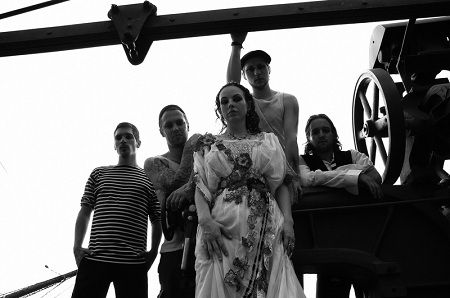
Interview by Ed MacLaren

After more than ten years and four albums Germany’s Mandrake continue to impress with their doom inflected brand of dark gothic metal. On their latest release, “Innocence Weakness”, Mandrake continue to expand and refine their trademark sound and deliver a stunning album that enraptures the listener from start to finish. Femme Metal got the opportunity to chat with vocalist Birgit Lau about the evolution of “Innocence Weakness”.
Congratulations on the release of “Innocence Weakness”! It’s a wonderful infusion of gothic metal and otherworldly images – lyrical and musical. You must be very satisfied with the final product. What about the creation of “Innocence Weakness” gave you your greatest satisfaction?
Thank you very much for your appreciation. Indeed, I’m satisfied with our new album. It’s hard to say what gave me my greatest satisfaction. It always is a wonderful experience being in the studio and doing all the recordings and finally being able to listen to the final product.
“Innocence Weakness” features Mandrake’s doom metal influence but it’s also filled with moments of ethereal beauty. There’s almost a 90s British shoegaze feel with the layered guitars and keyboards on many tracks. Did the band decide to take a different approach to this album after the success of “Mary Celeste”?
Fortunately, we don’t stare at our shoes when performing, I mean, maybe just if the shoes are brand new! The comparison of Mandrake to British shoegaze is completely new to me but I do understand what you mean. I wouldn´t say that we took a different approach. I mean, a couple of years have passed since we released “Mary Celeste”. Of course, we matured and so did our music. What I want to say is that we didn’t change anything on purpose, so I wouldn’t call it a different approach.
Musically, “Innocence Weakness” has more layering of instrumentation, blending the instruments into a wall of sound – singularly lush and distinctive. You’ve developed a musical style that sets you apart from other metal bands – especially of the femme metal variety. Was this a conscious goal for Mandrake?
No, I wouldn’t call this a conscious goal. We neither wanted to imitate a musical style nor did we consciously set ourselves apart from one. We’re just performing the style of music we like and we can identify with.
“Prelude”, “Innocence” and “Weakness” are beautiful instrumental pieces that thematically frame the vocal tracks on “Innocence Weakness”. They ease the listener into the album, provide a cleansing reprieve at the midpoint and softly conclude the listening experience. Did you structure “Innocence Weakness” to provide an emotional journey of contrast and relief for the listener?
As you might know most of us grew up near the coast. Many times the subject of our songs has to do with the sea. This is also the place where I get my inspiration. The lyrics I write have to do with personal experiences or experiences of friends I’m thinking about and I’m trying to retell these situations or experiences in some songs. How does the term “Innocence Weakness” reflect the lyrical content of the album? What is the story you’re trying to tell?
Until now, our lyrics were dominated by the topics “sea” and “water” as mighty elements of nature. This topic has been exhausted to a great extent. Many lyrics of the new album deal with the topic of loneliness. They’re not just about physical loneliness but also about the inner loneliness. More and more people live together in social communities but are still isolated somehow. A lack of responsibility for one another, anxiety about the future, lacking perspectives and a stronger competition in all areas of life are what “modern loneliness” represents in our opinion. Some of the lyrics indirectly reflect these thoughts. Every song tells its own story and not all of them are related to this context. But I don’t want to interpret our lyrics so much as this is up to the listener and what he or she associates with them.

Your vocals provide an excellent ethereal contrast to the down-tuned guitars, driving rhythm section and keyboard washes of Mandrake’s music. Plus you’ve developed a unique vocal style that avoids the typical femme metal clichés. Your voice can float over the waves of music behind it but can also cut loose on tracks like “Serenade to the Sea” and “Indignation”. How do you approach developing your vocal melodies for the album? Has this approach evolved over time?
Oh, wow I’m starting to blush. Thank you very much.Well, the vocal melodies develop over time. I get the instrumental piece and then I listen to it many times. First, I try to associate a topic with the melody and then I try to match the topic to the melody. It is important to me that the melody has some recognition value. I try different melodies and the one I can remember is chosen! This hasn´t really changed over time. Sometimes I find a melody immediately but there are also songs where it takes weeks to think of a melody that fits. Originally, Lutz de Putter provided all of Mandrake’s vocals. After you joined the band in 1999, your share of the vocals has steadily increased. What sparked this change in vocal focus? The change in vocal focus results from the fact that I did not want to be a background singer anymore! I mean isn´t it embarrassing to be on the stage with no instrument and just gaze at your shoes because you only have to sing all of five minutes? With that said, how would you describe Mandrake’s musical evolution from “Calm the Seas” to “Innocence Weakness”? “Calm the Seas” was similar to the old songs of My Dying Bride and Paradise Lost. On “The Balance of Blue” and “Mary Celeste” our music turned more mainstream and softer. So “Innocence Weakness” is a way back to where we started. You could also say (even if it is worn out): Back to the roots!
What do you notice the most when you go back and listen to the vocals on your earlier material? Do you smile or cringe a bit? Well it depends. Sometimes I smile; sometimes I cringe. When I listen to the old songs I recognize that my voice sounded quite childlike. I guess it is important to be self-critical and work on the parts that cause the wince. The number of strong releases from female-fronted metal bands is piling up this year. It seems like every week another band is releasing a genre-defining album. “Innocence Weakness” is no exception. With strong competition for fan attention increasing around the globe, is there any pressure to release a product that will stand out among the sea of corsets and leather? Well I’m observing this as well. I would say that it is no pressure for us to be outstanding because we do not depend on the gains. This does not mean that we are not ambitious but all of us have jobs and music is our hobby. Of course, it would be great to earn your money by selling the albums but as you said, there is strong competition and it’s really difficult and time-consuming and you also have to be very lucky if you want to be at the top of the charts. To you, what makes Mandrake unique within the gothic metal genre? This is a difficult question. We try to sound different from all the orchestral and symphonic gothic metal bands. I hope this has worked.
Will you be touring to support “Innocence Weakness”? Where will fans be able to see Mandrake perform the new album live? We really like to play on stage, but it will always be a problem as our jobs take too much time. (Famous) Last words? “After silence, that which comes nearest to expressing the inexpressible is music.” – Aldous Huxley
Links